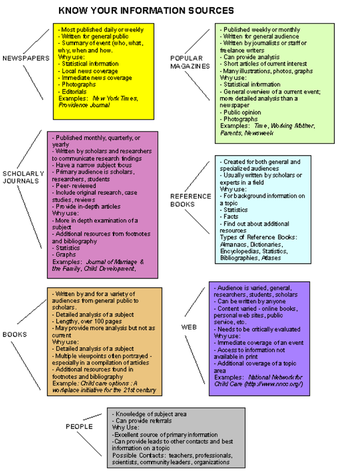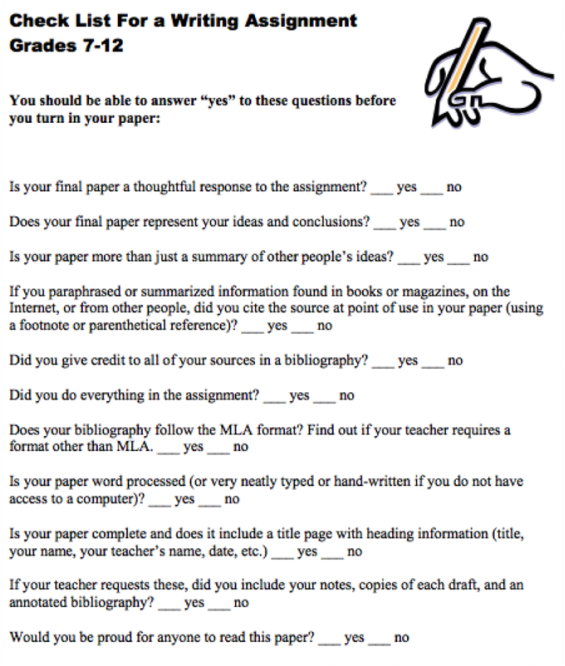*Define your task
Ask the following questions:
What is the assignment?
—What is the essential question?
—What is my hypothesis/thesis statement? (Pre-research / Post-research)
Brainstorm ideas / begin looking for information and see what develops
--Is there enough information to do justice to my topic?
For More information:
—Deep Web Search: http://yippy.com can help you narrow your topic
—Searching tutorial: https://owl.english.purdue.edu/owl/resource/558/03/
—Thesis builder: http://www.tommarch.com/electraguide/
—Graphic organizers (many types available here):
--http://www.graphic.org/goindex.html
Ask the following questions:
What is the assignment?
—What is the essential question?
—What is my hypothesis/thesis statement? (Pre-research / Post-research)
Brainstorm ideas / begin looking for information and see what develops
--Is there enough information to do justice to my topic?
For More information:
—Deep Web Search: http://yippy.com can help you narrow your topic
—Searching tutorial: https://owl.english.purdue.edu/owl/resource/558/03/
—Thesis builder: http://www.tommarch.com/electraguide/
—Graphic organizers (many types available here):
--http://www.graphic.org/goindex.html
|
*Locate and Access Sources Where will I find the best sources? —How will I access the sources? Ask a librarian for help —Consider print sources as well as the Internet. —Online, will you use the free web or a database (called the “deep web” or “invisible web”) Use a search engine when you: —Want to go to a specific website —Have a narrow or unusual topic or have several keywords —Want to retrieve a large number of documents for your topic —Want government information and forms —Want to search for particular types of documents, file types, languages, etc. —Are willing to evaluate the web site’s content? Use databases when you want: —Newspaper articles —Magazines/journal articles —Encylopedia articles —Biographical information —Published material that has gone through a review and editing process, ensuring a greater likelihood of accuracy and reliability! Complete: Know your Sources Google Survey |
Information Seeking Strategies and Internet Credibility:
Ask yourself what are the best sources of information for the project.
—Begin by searching the Destiny catalog or LAUSD Digital Library for resources. If you use Google, make sure to use Google Advanced Search or Google Scholar only!
—How will I know if the sources are accurate and authoritative?
Consider:
—Who? Qualification of the author
—What? Accuracy of information and coverage
—Where? Address, design, and technical quality
—When? Currency
—Why? Purpose of the information
Information Seeking Strategies and Internet Credibility:
Ask yourself what are the best sources of information for the project.
—Begin by searching the Destiny catalog or LAUSD Digital Library for resources. If you use Google, make sure to use Google Advanced Search or Google Scholar only!
—How will I know if the sources are accurate and authoritative?
Consider:
—Who? Qualification of the author
—What? Accuracy of information and coverage
—Where? Address, design, and technical quality
—When? Currency
—Why? Purpose of the information
Can I Trust This Website?
Beware of these Internet dangers:
Internet hoaxes (spoofs, parodies)
The perpetuation of urban legends
Scams and frauds
Hate sites
Learn to spot the fakes!
Consider the url extension of the website:
.edu
.k12
.gov
.org
.net
.com
Please visit the following websites to evaluate their credibility.
After perusing each website, take a moment to complete a Google survey about the site.
DHMO Website
DHMO Google Survey
Dog Island Website
Dog Island Google Survey
Beware of these Internet dangers:
Internet hoaxes (spoofs, parodies)
The perpetuation of urban legends
Scams and frauds
Hate sites
Learn to spot the fakes!
Consider the url extension of the website:
.edu
.k12
.gov
.org
.net
.com
Please visit the following websites to evaluate their credibility.
After perusing each website, take a moment to complete a Google survey about the site.
DHMO Website
DHMO Google Survey
Dog Island Website
Dog Island Google Survey
Performing Effective Searches:
Cluster/Brainstorm your topic.
OR
Begin by writing a sentence about your topic:
I want to do my project about some kind of ocean mammal such as whales or dolphins.
Pull out key words/ phrases:
Ocean mammal, whales, dolphins
Expand your list with synonyms and related words:
Ocean-sea-marine
Mammals-arm-blooded animals
Ocean mammal-marine mammal
Dolphins-porpoises
ETC.
Expanding Your Search
Consider:
Are there larger or smaller categories you could use?
—Larger categories:
—Ocean Mammal-ocean life, marine life, mammals, animals
—Smaller categories
—Whales-blue whale, killer whale, humpback whale
—Dolphins-bottle nose dolphin
--
Now you have a list of terms to begin searching for information:
—Synonyms and related terms
—Ocean, sea, marine, ocean mammal, marine mammal, whales, cetaceans, dolphins, porpoises
—Larger Categories
—Ocean life, marine life, mammals, animals
—Smaller Categories
—Blue whale, killer whale, humpback whale, bottle nose dolphin
Practice this process using the Google Survey below for a topic of your choice:
Google Survey for Keyword Searches
TIPS:
Search Only the First 10-15 Links on a Database or Search Engine's Results Page
Look for Links at the Top, Bottom and Sides Before Reading the Material on a Website
Use the Function to Search the Webpage for Keywords (Mac: command + F key; PC: ctrl + F key)
Skim and Scan Potential Sources
Frustrated? Stop After 15 Minutes and Try a NEW Approach
*Use of Information: Extracting What You Need
Ask yourself:
How will I gather and record the information for my project?
—How will I give credit to my sources?
Below is more information on extracting information and citing sources
—How to paraphrase:
--http://www.wisc.edu/writing/Handbook/QPA_paraphrase2.html
--http://www.utoronto.ca/ucwriting/paraphrase.html
—Taking notes, use Cornell Notes as recommended by David Burke OR
Use notecards to help keep track of your sources and allow you to organize ideas more easily.
—Citation machine: http://citationmachine.net/
BE CAREFUL with online citation tools. ALWAYS use the long form, not the auto-fill tool.
Is It Plagiarism?
Searching and Citing Sources Groupwork
*Synthesis: Bring It All Together
Use the information you have found to meet your information need or the requirements of the task/assignment?
If working on an assignment, this is where you:
*Draw your own conclusions and express your own ideas based on the research!
*Utilize the ideas of others to inform your reader/audience or support your own perspective.
*Contextualize your references (no "naked quotes")
*Write and rewrite.
*Cite your sources, both in the text and on a works cited page.
*Evaluation: Are You Proud of Your Work?
Review the checklist below or your teacher's assignment rubric to make sure you have completed the assignment to the best of your ability.
Ask yourself:
How will I gather and record the information for my project?
—How will I give credit to my sources?
Below is more information on extracting information and citing sources
—How to paraphrase:
--http://www.wisc.edu/writing/Handbook/QPA_paraphrase2.html
--http://www.utoronto.ca/ucwriting/paraphrase.html
—Taking notes, use Cornell Notes as recommended by David Burke OR
Use notecards to help keep track of your sources and allow you to organize ideas more easily.
—Citation machine: http://citationmachine.net/
BE CAREFUL with online citation tools. ALWAYS use the long form, not the auto-fill tool.
Is It Plagiarism?
Searching and Citing Sources Groupwork
*Synthesis: Bring It All Together
Use the information you have found to meet your information need or the requirements of the task/assignment?
If working on an assignment, this is where you:
*Draw your own conclusions and express your own ideas based on the research!
*Utilize the ideas of others to inform your reader/audience or support your own perspective.
*Contextualize your references (no "naked quotes")
*Write and rewrite.
*Cite your sources, both in the text and on a works cited page.
*Evaluation: Are You Proud of Your Work?
Review the checklist below or your teacher's assignment rubric to make sure you have completed the assignment to the best of your ability.


